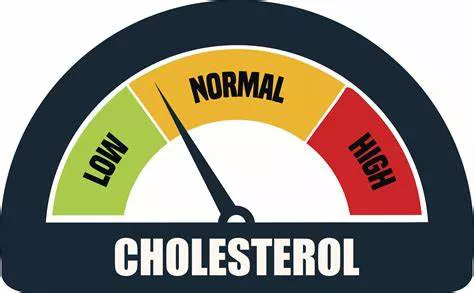Cholesterol is a waxy, fat-like substance found in every cell of the body and is crucial for producing hormones, vitamin D, and substances that help digest foods. However, high levels of cholesterol in the blood can increase the risk of heart disease.
Cholesterol levels tend to change with age and hence, monitoring and maintaining optimal levels is crucial for long-term health. This article explores what constitutes a healthy cholesterol level across different age groups, measured in millimoles per liter (mmol/L), which is a common unit of measurement used particularly in Canada, Europe, and many other parts of the world.
The Basics of Cholesterol: Understanding HDL, LDL, And Triglycerides
Before diving into the specifics by age, it’s important to understand the components of a cholesterol test. A standard lipid panel includes:
Total Cholesterol – The total amount of cholesterol in the blood, including all components.
Low-Density Lipoprotein (LDL) Cholesterol – Often referred to as “bad” cholesterol, higher levels can lead to a buildup of cholesterol in arteries.
High-Density Lipoprotein (HDL) Cholesterol – Known as “good” cholesterol, it helps remove other forms of cholesterol from the bloodstream.
Triglycerides – A type of fat (lipid) in your blood, high levels of which can also increase heart disease risk.
see also:What Is Hld Hyperlipidemia
What Is A Healthy Cholesterol Level by Age (mmol/L)?
Children and Adolescents
It’s generally recommended that children and teens have their cholesterol checked at least once between the ages of 9 and 11, and again between 17 and 21. The acceptable ranges for this group are slightly different from adults:
Total Cholesterol: Less than 4.4 mmol/L is considered healthy.
LDL Cholesterol: Less than 2.85 mmol/L is optimal.
HDL Cholesterol: Higher than 1.17 mmol/L is best.
Triglycerides: Below 1.7 mmol/L in fasting state.
Children are not typically exposed to the same cardiovascular risk factors as adults, but early intervention can help prevent the development of heart disease later in life.
Young Adults (20-35 Years)
As young adults transition from their late teens into their 20s and 30s, maintaining a healthy lifestyle is crucial to manage cholesterol levels:
Total Cholesterol: Should be below 5.2 mmol/L.
LDL Cholesterol: Less than 3.3 mmol/L is considered optimal.
HDL Cholesterol: Higher than 1 mmol/L is desirable.
Triglycerides: Should be under 2 mmol/L when fasting.
Young adults should also begin to pay more attention to diet and exercise as metabolism begins to slow.
Adults (36-65 Years)
For adults in this age group, cholesterol levels can start to naturally increase. A healthy lifestyle can mitigate some of these changes:
Total Cholesterol: Below 5.2 mmol/L is ideal.
LDL Cholesterol: Less than 3.3 mmol/L.
HDL Cholesterol: Higher than 1 mmol/L is advantageous.
Triglycerides: Below 2 mmol/L in fasting state.
Screenings should become more regular in this age group, especially if there are risk factors such as diabetes, hypertension, or a family history of heart disease.
Seniors (Over 65 Years)
Older adults often have higher cholesterol levels, which can be a significant risk factor for heart disease:
Total Cholesterol: Below 5.2 mmol/L remains the goal.
LDL Cholesterol: Keeping it under 3.3 mmol/L is crucial.
HDL Cholesterol: Maintaining levels higher than 1 mmol/L is beneficial.
Triglycerides: Less than 2 mmol/L.
For seniors, medication may be necessary alongside lifestyle changes to manage cholesterol levels effectively.
Factors Influencing Cholesterol Levels
Several factors can influence cholesterol levels, including:
Diet: Consumption of high amounts of saturated fat and trans fats can raise cholesterol levels.
Physical Activity: Regular exercise helps raise HDL cholesterol levels.
Weight: Being overweight or obese can increase bad cholesterol and decrease good cholesterol.
Age: As you age, your body chemistry changes, potentially raising LDL cholesterol levels.
Genetics: Family history can influence your cholesterol levels and risk of heart disease.
Managing And Monitoring Cholesterol
Lifestyle Changes
The first line of defense against high cholesterol is often lifestyle changes:
Diet: Eating a heart-healthy diet that includes fruits, vegetables, whole grains, poultry, fish, and nuts.
Exercise: Engaging in at least 150 minutes of moderate aerobic activity or 75 minutes of vigorous activity weekly.
Weight Management: Maintaining a healthy weight can help improve your cholesterol profile.
Smoking Cessation: Quitting smoking can improve your HDL cholesterol level.
Medication
When lifestyle changes are not enough to control cholesterol, medications may be necessary:
Statins are the most commonly prescribed medication for cholesterol management, effective in lowering LDL levels.
Bile acid sequestrants, niacin, and fibrates are other drugs that might be recommended depending on individual cases.
Conclusion
Understanding and maintaining healthy cholesterol levels by age is essential in preventing long-term health issues, particularly cardiovascular diseases. Regular screenings and proactive management through lifestyle or medications can help maintain these levels within a healthy range, ensuring overall well-being through the years. As always, individual recommendations for managing cholesterol should be provided by a healthcare professional based on personal health history and risk factors.

